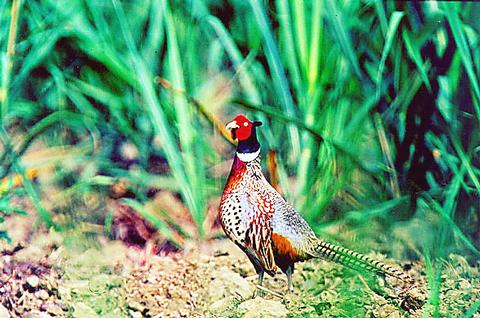In addition to helping prevent mudslides, the government's Plains Land Afforestation Project hopes to give Taiwan's endangered ring-necked pheasant back its habitat, forestry officials said yesterday.
The ring-necked pheasant, also known as the "Pearl of the Grasslands," is a protected species under Taiwan's Wild Animals Protection Law (

PHOTO COURTESY THE COUNCIL OF AGRICULTURE
As its living space continues to shrink, its population has diminished to 1,400, 516 of which live in Hualien County.
"Development on the plains over the past four decades has destroyed the habitat of the ring-necked pheasant," said Y Star Huang (
"In addition to its ever-shrinking habitat, contamination from pesticides as well as human encroachment has made sightings of the Taiwan ring-necked pheasant rare."
The ring-necked pheasant has a red face and a white ring around its neck.
There are 29 Asian pheasant species, of which Taiwan's ring-necked pheasant is one.
Taiwan's rare variety of the species lives mostly on the island's plains and near sugar cane.
They mostly eat insects, leaves, crops and seeds.
Taiwan ring-necked pheasants can be found in eastern Taiwan, in Taitung and Hualien, and the sugar-cane area of Tainan in western Taiwan.
The disappearance of the ring-necked pheasant's habitat is particularly severe in western Taiwan, due to the changing use of cultivated land, Huang said.
In Taiwan, large areas of sugar-cane land have been converted into industrial areas, schools and hospitals.
The construction of highways and railways are also responsible for the destruction of the pheasants' habitat.
The main difference between the Taiwan ring-necked pheasant and foreign varieties of the bird is the white feather on its abdomen near the side of its wings. The plumage of the bird's barred tail is olive green and its stripes are wider than that of other species of Asian pheasant.
Interbreeding between non-Taiwanese Asian species has also affected the existence of the Taiwan ring-necked pheasant, Huang said.
Non-Taiwanese pheasants from the US are sometimes imported to Taiwan for manufacturing plume products.
"Mating with foreign species that have gone wild has destroyed the purity of the Taiwan variety and made the it vulnerable to extinction," Huang said.

US President Donald Trump yesterday announced sweeping "reciprocal tariffs" on US trading partners, including a 32 percent tax on goods from Taiwan that is set to take effect on Wednesday. At a Rose Garden event, Trump declared a 10 percent baseline tax on imports from all countries, with the White House saying it would take effect on Saturday. Countries with larger trade surpluses with the US would face higher duties beginning on Wednesday, including Taiwan (32 percent), China (34 percent), Japan (24 percent), South Korea (25 percent), Vietnam (46 percent) and Thailand (36 percent). Canada and Mexico, the two largest US trading

AIR SUPPORT: The Ministry of National Defense thanked the US for the delivery, adding that it was an indicator of the White House’s commitment to the Taiwan Relations Act Deputy Minister of National Defense Po Horng-huei (柏鴻輝) and Representative to the US Alexander Yui on Friday attended a delivery ceremony for the first of Taiwan’s long-awaited 66 F-16C/D Block 70 jets at a Lockheed Martin Corp factory in Greenville, South Carolina. “We are so proud to be the global home of the F-16 and to support Taiwan’s air defense capabilities,” US Representative William Timmons wrote on X, alongside a photograph of Taiwanese and US officials at the event. The F-16C/D Block 70 jets Taiwan ordered have the same capabilities as aircraft that had been upgraded to F-16Vs. The batch of Lockheed Martin

China's military today said it began joint army, navy and rocket force exercises around Taiwan to "serve as a stern warning and powerful deterrent against Taiwanese independence," calling President William Lai (賴清德) a "parasite." The exercises come after Lai called Beijing a "foreign hostile force" last month. More than 10 Chinese military ships approached close to Taiwan's 24 nautical mile (44.4km) contiguous zone this morning and Taiwan sent its own warships to respond, two senior Taiwanese officials said. Taiwan has not yet detected any live fire by the Chinese military so far, one of the officials said. The drills took place after US Secretary

THUGGISH BEHAVIOR: Encouraging people to report independence supporters is another intimidation tactic that threatens cross-strait peace, the state department said China setting up an online system for reporting “Taiwanese independence” advocates is an “irresponsible and reprehensible” act, a US government spokesperson said on Friday. “China’s call for private individuals to report on alleged ‘persecution or suppression’ by supposed ‘Taiwan independence henchmen and accomplices’ is irresponsible and reprehensible,” an unnamed US Department of State spokesperson told the Central News Agency in an e-mail. The move is part of Beijing’s “intimidation campaign” against Taiwan and its supporters, and is “threatening free speech around the world, destabilizing the Indo-Pacific region, and deliberately eroding the cross-strait status quo,” the spokesperson said. The Chinese Communist Party’s “threats